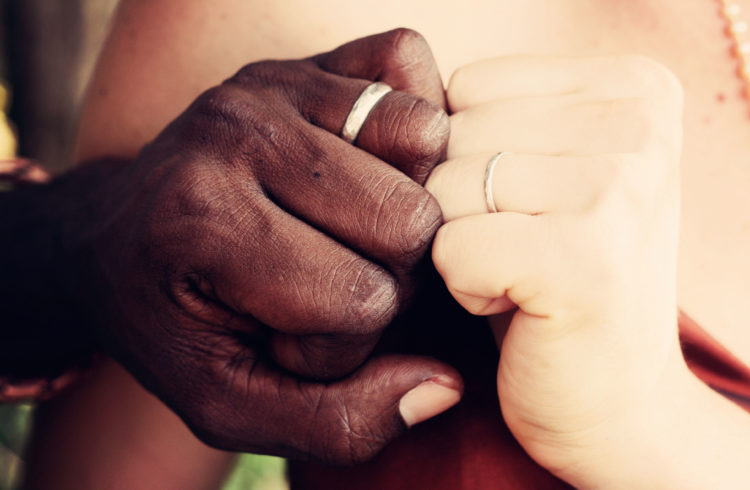“She wasn’t expecting you.”
I can’t tell you how many times I’ve said those words to a young black man who was struggling through a relationship with his white girlfriend’s mother, father, or friends. When most parents envision their children’s future we really don’t use much imagination. We’re not into details. I know this as the father of two daughters. Until forced to do so, we generally envision our kid’s lives as slightly wealthier versions of our own. But sometimes life serves us a series of events—like Peter at Cornelius’ house—which force us to renegotiate what we think and feel.
That was the case earlier this week when The Gospel Coalition posted an article entitled, When God Sends Your White Daughter a Black Husband. A mother was compelled to renegotiate what she believed about race and God when her white daughter began dating a black man. This journey required her to revamp her existing, yet shallow, theological, cultural, and social frameworks. (see also this excellent response by Pastor Bryan Loritts, “The ‘Dreaded Glenn’: A Response to Ms. Gaye Clark).
I find myself saying, “she wasn’t expecting you,” because I’m black, my wife is white, and young black men dating white women find me. And, yes, the moms often have a hard time. It’s not unusual.
Classic Examples
Last year, a college student told me about her mother. The girl had come home at Christmas with a black eye. Her mom grilled her about whether her new, black boyfriend was abusive. He wasn’t. She was a softball player. Third base. The hot corner! She had taken a line drive to the eye. The mom had never asked that about previous boyfriends, and we all know that no athlete makes it through college without getting a few bumps and lumps. Parents typically assume any new injury is sports-related, but when a black man enters the life of a white woman, those assumptions get trumped.
Another friend’s future mother-in-law fretted whether his parents could afford the wedding’s rehearsal dinner and what kind of “strange food” they would serve. She was equally nervous about whom to invite to the wedding. Again, the entrance of black people into white systems creates anxiety and disequilibrium.
It’s been a long time since Sydney Poitier and Katharine Houghton showed up at dinner at Spencer Tracy’s and Katharine Hepburn’s place, but the conversations aren’t all that different. We act like a bunch of progress has been made, but it’s never as much as we’d hoped. (My youngest daughter “Katharine” is named after Katharine Hepburn. See what we did there?)
When my wife and I started dating, my mother-in-law experienced a small amount of the same. My mother-in-law is simply one of the least materialistic, instinctively kind, and genuinely caring people I know. I was simply not what she expected. She didn’t have a problem. She was never against me. She just didn’t know what to make of it all, but she did know how she was going to behave. Most people avoid dealing with race up close. That privilege crumbles when you get someone you weren’t expecting. Most people avoid dealing with race up close until that privilege crumbles. Click To Tweet
Most white Americans believe whiteness is normal and preferable. America’s cultural myth is that Caucasians from European descent are the heroes of the American story. It’s what made America great and what some believe will make America great again. Racial and religious minorities are incidental and, by gosh, they oughtta thank white-folks for even allowing them to be here (like when Pat Buchanan said “blacks ought to get down on their knees and thank God to live in America…no people anywhere have done more to lift up blacks than whites.”) America’s cultural myth is that Caucasians of European descent are the heroes. Click To Tweet
Three Confessions Ms. Clark Said, but Didn’t Say
Without examination, many people – of all races – believe in preferable whiteness. It may have been the demythologizing of Caucasian greatness that stunned Gaye Clark when her daughter brought home someone she didn’t associate with greatness.
For my part, I’m grateful she shared her experience. Her anxieties and learnings are almost universal. If you’re shocked that it took this experience for her to come to these new conclusions, you might not be a progressive as you imagine. Your world may be more restricted than you think. It’s sad that’s Gaye’s experience isn’t restricted to her, but it’s not.
Unfortunately, it’s the kind of article that is difficult to hear. Some will weep for Gaye and her daughter because, “she had to settle for a black.” Those on the other side will only hear condescension and pomposity. They won’t be generous enough to understand Gaye’s mindset and realize it’s an attitude she is fighting through.
Having lived Gaye’s experience, and while trying to read her in light of her love and dedication to Jesus, and in the spirit of reconciliation, this is what I think she means. Only I’ll state it more bluntly. Think of it this way: This is what she said, but didn’t say. In sum, Gaye makes three confessions.
CONFESSION #1: “I Was A Racist and Didn’t Realize It”
It’s okay. Most people don’t think they’re racist. Majority cultures define racism as clear animosity toward and determined detrimental behavior toward other races. We don’t think of our implicit racial associations as racism. We’re not racist when we move houses, schools, or churches to be “good neighborhoods.” We just want the best education for our kids! We’re not racists when we see escalating racial disparities in law enforcement or prison sentencing or economic gaps.
We assume there must be something behind all of this. That’s not as easy to do when “those people” are going to be at Thanksgiving dinner. Listen. It’s okay to say, “I was racist and didn’t realize it. This event stirred something inside me that I’d had the privilege of simultaneously ignoring and denying.”
We are made better by confessing our sins rather than concealing them. Gaye says, “I could only smile at God’s plan and asked his forgiveness for my presumptions.” It’s easy to miss this because she did not use the words “sins, confess, or repent” but that’s what she said but didn’t say. She asked God for forgiveness. She should have! I don’t expect anyone to get over their racism overnight. The tragedy is that we don’t deal with our racism until it’s absolutely unavoidable!
Gaye “remembers” that all people are “made in the image of God.” This needs to be heard. It’s sad we have to “remember” that people unlike us are God’s children too. That’s not just true for interracial marriage, but for the church’s posture toward the LGBTQ community, those whose theology is different from ours, refugees, those who vote differently than us, and in every area of difference.
How do you want your kids to be treated? Treat all of God’s kids that way.
Equality in thought, word, and deed need not be grounded in an understanding of “heaven’s demographics,” but can simply be rooted in not “considering yourself more highly than you ought” or “consider(ing) others better than yourselves.” Calling on the afterlife is fine, but unnecessary. This is Christianity 101. The tragedy is that we don’t deal with our racism until it’s absolutely unavoidable! Click To Tweet
CONFESSION #2: “My Friends, Family, & Church Are Racists Too”
Gaye writes:
One woman in church looked over at Anna and Glenn and gingerly asked, “Are they … dating?”
“Engaged!” I grinned and winked at them.
She gave a pained smile, and then sighed and shook her head. “It’s just … their future children. They have no idea what’s ahead of them!”
This reveals the racial animosity of the people in her pew.
Folks at her church were racists and she began to see it first hand. Guess what? A lot of us have racist friends! The truth is that the Christian church, with it’s deeply held affection for the homogenous church principle, has distorted our mission and convinced us that our job is to warehouse a fellowship of sames so that our lives will be easier and churches can grow faster and experience less friction.
For many American Christians, it’s easy to silo in racial, religious, and economic enclaves where we don’t have to deal with those who are “other” (See Scot McKnight’s, A Fellowship of Differents). We’re uncomfortable with difference and differents. What’s more, the distance between us allows us say we’re not racist, but never have to prove it. Affection for homogeneity makes the church's job to warehouse a 'fellowship of sames.' Click To Tweet
CONFESSION #3: “I Thought Blackness Was A Disease & I Didn’t Want My Daughter To Catch It”
We’ll likely never see the day that TGC or any other Christian website post an article entitled, When God Sends Your Daughter A Rich Son-in-Law. Why? We desire wealth.
Even though Jesus talked extensively about the dangers of wealth, we don’t see riches as problematic. We see “black” as a problem. The very existence of Gaye’s article is proof enough. Blackness is not a sin, but it’s better if you can avoid it, is the thought. Why else assume an interracial marriage would be more difficult than others or frame it as a “trial” of marriage?
“Black” is somehow a disability; such a vitiating virus that we need to re-engage our theology when we find ourselves in the presence of the infected. Characteristics like wealth and impatient; ingratitude and haughtiness; even though warned against in scripture, aren’t considered a big deal.
What does it tells us when our daughters come home accompanied by black people and it requires a re-examination of what we believe God? I’m not certain, but should our future sons-in-law be heirs to wealth and access, we’d consider that an unquestioned benefit. It says something when the temptations Jesus warned against are considered blessings, and the purpose of his ministry – “one new creation” – are obstacles to church growth.
Why do we need to coerce ourselves into rejoicing when blackness marries our daughters? Why do we comfort ourselves with reminders that all marriages have “difficulty”? Being a black man in America comes with its own adversity, but it’s not an ailment. We’ll likely never read an article entitled 'When God Sends Your Daughter A Rich Son-in-Law.' Click To Tweet
We’re All in Process
Gaye Clark raised a daughter unmoored by the deleterious implicit associations rooted and unacknowledged in Gaye’s own heart. It’s a blessing, testament, and the desire of every parent to raise children who are better people than they are. Gaye should be applauded for that!
Though there’s plenty of paternalism lurking beneath her words, she shouldn’t be demonized for them. Rather than burying her experience and process under a cave of attacks, we need more people sharing openly about where they are concerning race. The false promise of political correctness leaves people wounded and discouraged from ever uttering another word about race. Honesty is the only way to grow. It’s the only way for the church to live up to her calling at ministers of reconciliation. To shut down honesty means curtailing necessary conversations, needed confessions, and new commitments.
Unspoken prejudice doesn’t go away. It goes underground.
Though I may wish she had sooner realized that people like me were made in the image of God, Gaye’s experience is just the thing many future and existing mothers- and fathers-in-law need to hear. It will help them take the next right step. And life is always about taking the next right step.
UPDATE: Gaye Clark has asked TGC to remove her article. I have asked her via Twitter not to. This is a conversation we need to have.








Missio Alliance Comment Policy
The Missio Alliance Writing Collectives exist as a ministry of writing to resource theological practitioners for mission. From our Leading Voices to our regular Writing Team and those invited to publish with us as Community Voices, we are creating a space for thoughtful engagement of critical issues and questions facing the North American Church in God’s mission. This sort of thoughtful engagement is something that we seek to engender not only in our publishing, but in conversations that unfold as a result in the comment section of our articles.
Unfortunately, because of the relational distance introduced by online communication, “thoughtful engagement” and “comment sections” seldom go hand in hand. At the same time, censorship of comments by those who disagree with points made by authors, whose anger or limited perspective taints their words, or who simply feel the need to express their own opinion on a topic without any meaningful engagement with the article or comment in question can mask an important window into the true state of Christian discourse. As such, Missio Alliance sets forth the following suggestions for those who wish to engage in conversation around our writing:
1. Seek to understand the author’s intent.
If you disagree with something the an author said, consider framing your response as, “I hear you as saying _________. Am I understanding you correctly? If so, here’s why I disagree. _____________.
2. Seek to make your own voice heard.
We deeply desire and value the voice and perspective of our readers. However you may react to an article we publish or a fellow commenter, we encourage you to set forth that reaction is the most constructive way possible. Use your voice and perspective to move conversation forward rather than shut it down.
3. Share your story.
One of our favorite tenants is that “an enemy is someone whose story we haven’t heard.” Very often disagreements and rants are the result of people talking past rather than to one another. Everyone’s perspective is intimately bound up with their own stories – their contexts and experiences. We encourage you to couch your comments in whatever aspect of your own story might help others understand where you are coming from.
In view of those suggestions for shaping conversation on our site and in an effort to curate a hospitable space of open conversation, Missio Alliance may delete comments and/or ban users who show no regard for constructive engagement, especially those whose comments are easily construed as trolling, threatening, or abusive.